I wore a
large grey hat pulled over my eyes which I never
took off. I had to engage the models. A small girl
and her brother came and sat for me and also a
large and very fat woman. After several weeks I
had thirty students, including five tough Australian
soldiers, who were very serious and always kept
cigarettes behind their ears. I used to ask them to
tea, two at a time. They were very simple-minded
and unspoilt. I knew another Australian at that
time and he used to meet me after the class was
finished, in Victoria Street, and take me out to a
meal. I did not introduce him to my students as
I thought it might create a bad impression of
frivolity. My Australian wrote plays. He took me
out to dinner, sometimes to Frascati's
and the
in
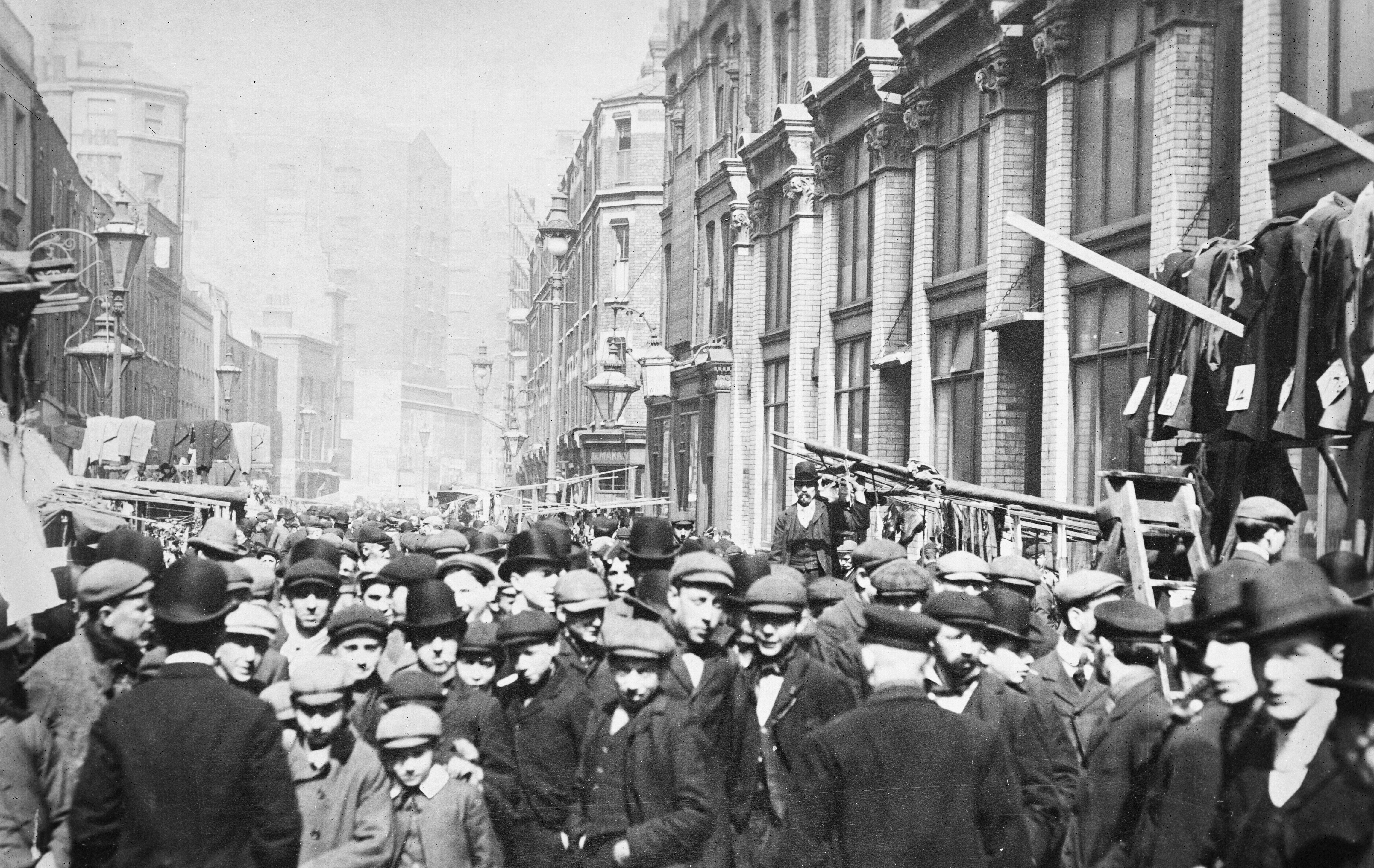
Monico. He never drank anything at all and I
wondered why. One day I went to see a friend of
mine whose hobby was collecting liqueurs. He had
a hundred and fifty different bottles arranged on a
shelf. I got to his flat about nine-thirty only to find
my unfortunate Australian completely drunk. I
asked him where he lived and took him out into the
Strand to find a taxi. We found a horse cab and I
took him home to his lodgings in Victoria where I
to his lodgings in Victoria where I
put him to bed. This was not so easy as he was in
uniform and had puttees on. I had never undone
puttees before and this took some time. I eventually
put him to bed and went home. I came the next
morning and got him some whisky. He was one of
those unfortunate people who, if they have one
drink, cannot stop. I felt rather responsible about
hint He knew hardly anyone in London. He got
driink again the next day and remained so for
about a week. I told him that he had better come
and stay at my place and sober up. He did, and
remained drunk for several more days. I went to a
friend of mine who had a collection of drugs of all
kinds. I asked if he could give me anything to stop
the Australian from drinking. He gave me a small
tabloid and told me to put it into his tea. I did this
the following morning and went out thinking that,
later on in the day, I would come home and prob
ably find a corpse. I came home in the afternoon
and found my patient very well indeed. He refused
to touch a drink of any kind and, shortly after the
War, I saw him off at Waterloo for Australia* He
said that he would come back in four years to fetch
me and to marry me. I believe he did come back
but I was, unfortunately, in Paris.

One day I was walking along Tottenham Court
Road, and as I passed the National Cash Register
Building, I stopped and read the news about the
War. " Armistice " was written up in large letters.
I was not sure what it meant, but I saw further on
that hostilities would cease at 1 1.30. I thought that
on such an occasion one must find someone to talk
to. I went to my bank and got some money out and
went to Shoolbreds, where I bought two bottles of
champagne. I found Geoffrey Nelson, the painter,
the painter,
and we took a 'bus to Trafalgar Square. We then
walked down the Strand where, out of every window,
papers were being thrown. The street looked as if
there had been a snowstorm. I went to lunch at
the Eiffel Tower. There I found several people I
knew, Aldous and Julian Huxley, Carrington, and
the Sitwells. Before dinner I went to the Cafe
Royal where everyone was drinking and celebrating.
A friend of mine asked me to a party at his flat and
I walked to the AdelphL It was almost impossible
to find a taxi or a 'bus. As I was walking down
Whitehall I saw a crowd of people, and at the top
of an arc-light, on a ladder, was a man who was
taking the black paint off. We all watched him and
were quite dazzled when the light shone out again
with its pre-war glory. Everybody cheered loudly
and I went on to my party. It was a very fine party
indeed. Diaghilev was there, Massine, Lydia
Lopokova, the Sitwells, Henry Mond, who became
Lord Melchett, and many more people.  There was
There was
a pianola and we danced and I was accompanied
I was accompanied
home by David Garnett 
CHAPTER VIII PEACE
AT my Art Glass I generally drew with the
students. I taught three evenings a week and for
two nights a week I joined the St. Martin's Art
School and drew from the nude. They had a com
petition once a year for landscapes done in the
summer vacation and a Royal Academician came
and judged them. One evening I was drawing
and the Professor came to me and told me that
the R.A. could not turn up and would I judge
the paintings? This flattered me as I did not
realize that anybody knew who I was at all. The
work was not very good, but one picture I liked
very much; it was of a gipsy encampment and painted
in the style of the Douanier Rousseau .
.
I gave it the
first prize. This I knew would cause some distur
bance. I found that the young man who had painted
it was the nephew of Frank Brangwyn. I asked him
how much he wanted for it. He only asked a small
sum and I bought it from him. The St. Martin's
School gave dances from time to time. They were
very good and we brought bottles of whisky in suit
cases. I have always had a passion for Art Schools,
I don't know why! One doesn't learn very much
at them unless one is lucky enough to find an interest
ing professor like John Swan or George Lambert.
There is an atmosphere of calm and seriousness that
I like and find inspiring. One day I decided to move
from Fitzroy Street; why, I can't imagine. I took
the top floor of a house in Great James Street, 
Bloomsbury. It was very dark and depressing and
I regretted very much that I had gone there. 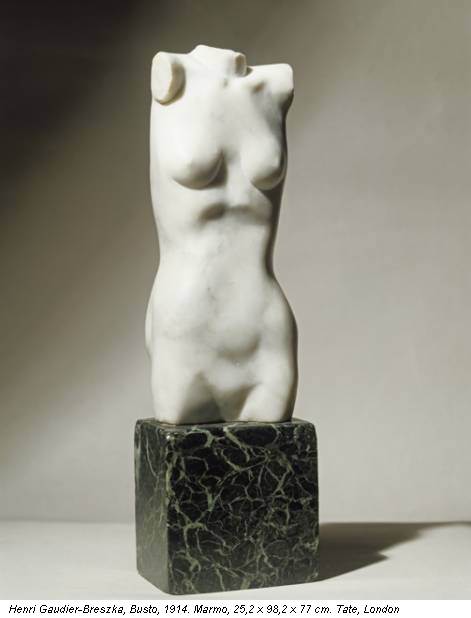
Towards the end of 1919 the Polish picture-dealer,
who had given a contract to Modigliani, came to
London. He had a large room that had been used
as a dancing-school and had an exhibition of the
young painters in Montpamasse. The most im
portant one was Modigliani. There were Soutine
and Kremegne and Zavado and Ortiz and many
others. The Modiglianis were not at all expensive
and the one of the boy, now in the Tate Gallery was,
I think, forty pounds. I found this exhibition very
inspiring and exciting and longed for Paris. Modig
liani had had consumption when he was eighteen
and what with his hectic life was in a very bad way.
The art dealer returned to Paris x as news came that
he was dying in the H6pital de la Charit6, where
where
Alfred Jarry and so many other celebrated people
have died. He died a few days later and telegrams
were sent to London to put up the prices of his
pictures. His wife, who was about to have a child,
went to stay with her family, who were sale bourgeoisie
and lived near the Panth6on. She slept in a room
on the fifth floor. She was so despairing and miser
able that, during the night, she jumped out of the
window and was killed. Her family, who were re
ligious, said that they could not have a suicide in
the house. She was picked up by some workmen
and brought to the studio in the Rue de la Grande
Chaumi&re, in which I lived for several years after
wards. Two friends of Modigliani's sat with her
body in case mice or rats were about the place;
they brought some wine and spent the night there.
On the day that Modigliani died his cat jumped out
of the studio window and was killed. Modigliani
was given a fine funeral in P&re Lachaise, and I
believe an enormous crowd followed the hearse.
His wife had always said that she would like to be
buried in the same cemetery as he was. Her
family would not allow this and she was buried
in the Cimetiere de Bagneux,
where Oscar Wilde
was originally buried. The friends of Modigliani
and she went very early in the morning to the funeral
and when the moment came when the funeral
guests shake hands with the relations, they stood
with their hands behind their backs as a protest.
The art dealer's exhibition had finished in London
by February. I don't think he sold many. He
ought to have, as there were some interesting
paintings. 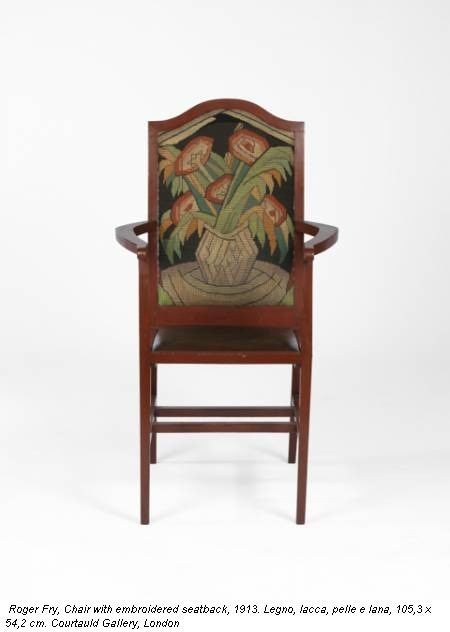
The Southern Syncopated Orchestra had arrived
in London. I went to hear them. I had never
heard negro spirituals sung before and they sang
very well indeed. I met Mrs. Reavis, who sang
beautifully and looked rather like a painting by
Gauguin. I asked her to sit for me and she came
one morning. I knew that Epstein admired coloured
people and I asked him if he would like to come and
draw too. He came round and did several very beau
tiful drawings, which he left on the floor and I had
framed. They were, of course, not signed, and a
few years ago I sold them.
The man I sold them to
asked me if I thought that Epstein would sign them;
I said that I could not possibly ask him as he would
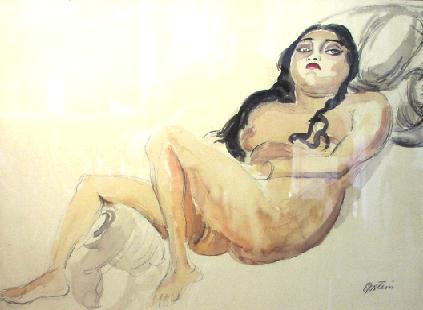
probably be cross to think that I had kept them.
Apparently Epstein was asked to sign them by the
man to whom I sold them. He was quite pleased
to do so and said, " These are drawings that I must
have done about twenty years ago." I used to go
two or three times a week, to hear the Negro
Spirituals and talk to Mrs. Reavis, who was most
charming and very beautiful. One day she told me
that a coloured dance was being given, and that the
President of Liberia and his family would be there.
There was first of all a conference where speeches
were made and they talked about the troubles of the
coloured races. I went with a friend of mine and we
with one other woman were the only white people
present. The orchestra were aching to play and
dance, and were getting rather bored with the
speeches. It all ended in a great deal of dancing
and a terrible lot of noise. I was introduced to the
President of Liberia and his wife and family. They
were very dark indeed, and the daughter, who was
about nine or ten, had the funniest hair, there was
hardly any of it and it was very short and woolly.
What intrigued me was how she had managed to
attach a large white bow of ribbon to it.
I was beginning to be very bored with London
and thought of returning to Paris as soon as I got
paid by the Art School; this was once every six
weeks, so I only had a very little money unless I
sold some pictures. I made enquiries about getting
a passport and found that it was quite easy for me.
I had to have a Belgian one. I waited anxiously for
the term to finish and decided to go to Paris as soon
as I could. The Russian ballet was in London still.
 They were at the Coliseum. One evening I was
They were at the Coliseum. One evening I was
walking up Whitehall after my class; the only
person in sight was a short man in a khaki uniform.
On his head he had a gold band to which was
attached a sort of white curtain. He stared at me
in rather an embarrassed way. I could not imagine
who or what he was. I turned round and saw that
he turned up Downing Street. I thought that I
would go to the gallery of the Coliseum and see the
ballet. When I got there, to my great surprise, in
a box was the little man in khaki, surrounded by
Arab chiefs. The little man was Colonel Lawrence
of Arabia. The ballet was very good indeed. They
played the " Good Humoured Ladies/ 5 which was
more French than Russian, but the decor and
Massine's choreography were very fine; although
the dancing was good, very good in some places,
none of it was up to the standard of the dancers
before the War in Russia and Covent Garden.
I had met, a few months previously, a very nice
man, who had been a prisoner of war in Germany.
He painted pictures and spoke quite perfect French.
He took me out quite often and was very kind to me.
I often wondered why he ever had taken to painting.
It was not because his painting was bad, it was very
competent, but he seemed to have missed his voca
tion so completely. He was the most perfect type
of soldier I have ever met and was quite obviously
cut out to be a General instead of a painter.
The term at the Art School ended.
TOWARDS the end of March I took the train to
Newhaven. I got into a third-class carriage with a
little dark man who looked like a foreigner. We
were the only people in the train and we did not
speak till we got to Lewes when he said, " Please, is
the next station Newhaven? " And I said that it
was. We talked quite a lot between Lewes and
Newhaven. I said, " I am going second-class on
the boat, but perhaps we will meet at Dieppe/' He
met me and bought me coffee and cigarettes and we
got into the train. I asked him what he did. He
was an Italian engineer who had been in the British
Navy and said that he was on his way to Bombay.
We were both half-reclining on the seats, one oppo
site the other. I said, " The women in Bombay
must be very beautiful, aren't they? " He sat
straight up on his seat and looking hard at me, said,
" I don't care about 'em good-looking," at which
speech I felt highly flattered. When we got to Paris
we shook each other warmly by the hand and said
that we hoped we would meet again.
I took a taxi and drove to the hotel that I stayed
in when I arrived there in 1914. I looked out of the
window and saw the lights of the Rotonde. It
had not changed. I went to the Rotonde and
asked a strange-looking young man where Zadkine
and Wassilieff were. I heard that they were both in
Paris. I went to Wassilieff 's studio and it was just
the same. Wassilieff asked how my figure looked

so I took off all my clothes and she said, Oui, la
mSme chose" so I put them on again, seeing that she
was satisfied that I had not dropped to pieces.
In a small cot, beside WassiliefPs bed, was a child.
I asked where it came from. Wassilieff said that
during the War, one day she was sitting in the
Rotonde and opposite to her she saw a most glorious
looking creature. He was very dark and wore the
uniform of a French officer. He had the Legion of
Honour and many medals. She called for the
waiter to bring some paper and did a drawing of
him. The officer called a waiter and sent a message
asking if he could buy the drawing. Wassilieff
spoke
to him but refused to sell it; she invited him to her
studio. He came to see her and Wassilieff found
that he was an Arab of Persian origin. She said that
they at once fell in love and that he always ate
grapes in bed during the night. One day he had to
return to his regiment. Some months later, Wassi
lieff, looking at herself in the mirror, noticed that
she was getting rather stout. She remembered that
her Mother had grown fat at quite an early age.
As she got fatter and fatter she decided to visit a
doctor who informed her that in four months 9 time
she would, if all went well, produce young. The
Arab had completely disappeared, but Wassilieff,
being a very courageous woman, was not unduly
upset. She gave birth to a small brown son, who
had a very loud voice indeed, and very nearly drove
the poor lady mad, She told me of all her troubles
during the War. In 1914, as I have already ex
plained, she had a canteen where Modigliani, Edgar,

myself and all the poor artists and writers dined for
one franc-fifty, which included a glass of wine and
one cigarette. Trotsky was in Paris. He had sold
newspapers in the streets and was quite penniless.
He ate every evening at the canteen, free of charge,
as Wassilieff was extremely kind and hospitable,
especially towards her own countrymen. The
troubles in Russia took place and Trotsky became a
great man. Someone said that Wassilieff had been
Trotsky's mistress. She was immediately arrested
and taken away from her son, who was only a few
months old. Ferdinand Leger, and Jeanne his wife,
took care of him, and poor Wassilieff was nearly
distracted. There was a great trial and all Paris
came to the Court to see the mistress of the great
man. They expected to see a great beauty and
when Wassilieff appeared they were very much
astonished to see a very small woman who looked
like a peasant. Wassilieff rose to her full height,
which was just under five feet, and made a speech.
She said that it was perfectly true that Trotsky had
dined at her canteen every night for many months,
as he was quite penniless, and she said, " And now
you imprison me. I, who have given birth to a
Frenchman who will fight for you. Look at my
hands, they are scarred with work and I have even
got a skin disease." She made such an impressive
speech that she was immediately allowed to go free.
Later on that evening I found Zadkine, who still
had the same studio in the Rue Rousselet. He had
then married the painter, Valentine Prax. She was
Valentine Prax. She was
a pretty, fair girl, who had been brought up in
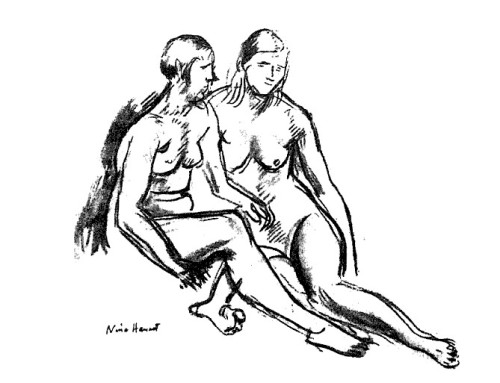
PARIS REVISITED
Morocco and had a great deal of talent. She worked
in the same building as Zadkine did and, as she
had to go away to the country asked me if I would
like to take her studio, which I did. I was so
pleased to be back in Paris that,, during the day
time, I walked about by myself, visiting all the
places I had been to before the War. I went to
La Ruche and saw the studio that Edgar and I had
lived in. I wore out a pair of shoes in three weeks.
The Rotonde closed at 10.30 as the war-time regu
lations were still enforced, so we went to people's
studios afterwards, if we did not want to go to bed,
and brought bottles with us. I found Brancusi, who

had moved to the Impasse Ronsin, and lived in a
large workshop opposite the studio, where Madame
Steinheil had lived and the tragedy had taken place.
He was pleased to see me and was just the same as
he had been before the War. He had sculpted a
bronze bird that was very beautiful. It was highly
polished and shone in the corner of the studio. The
only table was made of white plaster. It was
a solid lump, round, and about four feet in dia
meter. He asked me to come to dinner with him.
As he was very fond of cooking he said, cc Moi je
diteste Us restaurants, je mange chez moi, je visite le
boucher le matin et fachete les bifsteaks par le mitre"
When one dined with him one had to eat and drink
at the same time. He had marvellous burgundy
and one started with some aperitifs. As the evening
went on one got into almost a state of coma, as the
" bifsteaks " were certainly measured by metres,
and the Pommard was rather potent. I had heard

that he had done a statue of a princess. I had seen
one that he did about fourteen years before in
marble, of a very beautiful woman with her head
slightly leaning on one side and nude to the waist.
He had worked and worked on it until it was almost
completely abstract and resembled the same object
that Gaudier Brzeska's head of Ezra Pound did.
He had apparently sent it to the Salon d'Automne.
It was also made of polished bronze, the same
material that the bird was made of. It was placed
in the Salon in the middle of a large room. One
day the President arrived and sent for the police.
He explained to them that it was an indecent object.
The policeman said, " Je ne vois rien d'indfoent; fa a
Vapparence d'un escargot" Brancusi was sent for and
the President said, " It is disgraceful to exhibit such
a thing in the same place as Monsieur Rodin ex
hibited." Brancusi said, " Mais Monsieur Rodin tfa
pas pris la place pour perpttuiU" All the same he had
to remove it. The night I dined with him I asked
to see the portrait of the Princess. In the corner of
the studio I saw something wrapped up in a white
sheet. Brancusi uncovered it and said, " There it
is! " I did not like it as much as some of his things
and Brancusi said, " Voild le portrait de la Princesse! "
And I said, " And a remarkably handsome woman,"
and he covered it up again.
Wassilief I saw every day. She was not painting
much at that time but making the most amusing
dolls, portraits of people. They were made of kid
and the eyelashes and eyebrows were sewn in silk.
She went to a shop where they stuffed birds and
chose different coloured glass eyes to suit her
clients. She made two of Evan Morgan in evening
dress, with a white shirt and every detail of his
elothes, cuff links, buttons, shoes, all imitated in
an extraordinarily ingenious way. She also some
times did naked portraits-poupfes of people who
rather admired themselves with nothing on. She
painted the kid to match their skins. Sometimes
she would use smooth white kid and sometimes
chamois leather. She did a wonderful head of
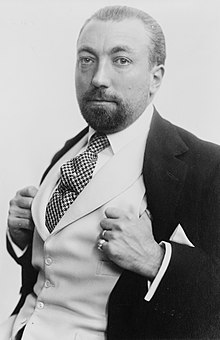 Paul Poiret, the dressmaker, and made his beard
Paul Poiret, the dressmaker, and made his beard
of orange wool, as he had red hair. One day
at the Rotonde I saw a young man with long fair
hair; he was badly dressed. I was with Beatrice
Hastings at the time. She had been sensible enough
to stay in Paris during the War. It was a repetition
of Edgar. She said, " He is a very talented Polish
artist; would you like to meet him? " I rashly said,
" Yes. 53 After the Rotonde closed we all went to
someone's studio in the Rue de la Grande Chau-
miere. He was then very drunk. I had an awful
presentiment that at any minute I should fall in love
with him. He had a guitar with him and sang
Polish songs. He was so unlike any of the people in
England and reminded me so much of Paris before
the War, that I asked him to come to my studio.
He .brought some of his paintings with him, which
were mostly of flowers and of a very beautiful colour.
I was delighted with him and we sang to his guitar
and drank white wine all the afternoon. He told
me that he had had a dreadful love tragedy the year
before, that he had loved a beautiful girl, who was
also Polish, and that she had died. He showed me
a photograph of her lying on her death-bed,
covered in lilies. As the white wine and the songs
had rather gone to our heads we both burst into
tears. I found out later on that it was not really
such a tragic story and that he had behaved very
badly to her and that the description of his tragic
feelings and great sorrow was really only put on for
my benefit. The young men of the Quarter always
made a point of cultivating English and American
women, as they were convinced that they had
money. I was glad to realize later on that they
were quite frequently disappointed. My money,
which was not very much, was beginning to give
out. I had been in Paris for three weeks and had
decided that I could not possibly live in England
any more. I had to go back and send in my resigna
tion to my Art School, which I quite well realized
was disgusting behaviour. I went back to London,
sent in my resignation, borrowed five pounds from
a friend of mine, and returned to Paris and the
abominable Pole. He met me at the Gare St.
Lazare, looking quite clean. He said, " Do not
spend your money on lodgings, come and stay in the
hotel that I do. It is near the Cimeti&re Mont-
parnasse, and costs very little." I took a room
there. I met with him an extremely nice Pole, who
lived in Modigliani's studio. The first night I
stayed in a little hotel near the Avenue d'Orl&ins,
where I was eaten up by bugs. I had met them
before in Grafton Street, and they certainly could
bite. The next morning E. suggested that I should
paint a picture out of the hotel window. The win
dow overlooked some roofs. As I had already done
several roof scenes in London, I was interested to
see some new roofs of a different colour. I found
that these were much more gay and I sat at home
most of the day painting. I gave him all the money
that I had as he would take me out in the evenings to
a workmen's restaurant, near by, in the Avenue du
Maine, and we had a good dinner and a small bottle
of red wine for almost nothing. What he did during
the day I did not know and never took the trouble
to enquire. One day I introduced him to a friend
of mine, whom I had known in London. She was
very good-looking and well dressed and had some
money, about eight hundred a year. I saw that she
liked him (she had a passion for stealing other
people's men), and that he liked her was obvious.
She had much more money than I had. I had
written to some friends of mine in London, and as
they knew that I was working, and that it was
cheaper for me to live in Paris, they sent me thirty
pounds.
This was in June 1920. I knew only two or
three people and those not very well. One of
them was Zborowski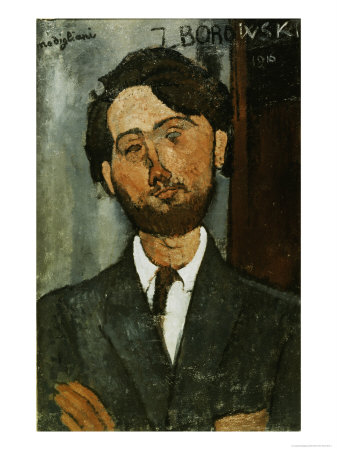
the picture-dealer who gave the
contract to Modigliani. I gave the Pole most of my
money to look after. One day he said, " I love
your friend and I am going away with her to
night. ' He disappeared, leaving me almost penni
less. This of course, was my own fault for being so
stupid, but, I thought, thinking of my past experi
ences, " One has to pay for all one's stupidities, and
they are very expensive, so perhaps that one day I
will learn some sense. " I went and wept on Wassi-
liefs chest. She, knowing the young man very well,
rather took it as a joke. I didn't, as, in about two
days 9 time, I was completely penniless. I went to
see Zborowski, who was kind enough to lend me
a hundred francs. I got thinner and thinner and
wondered what would happen to me. I met a very
nice Arab and also the other Pole whom I had met
with my friend. They knew what had happened to
me and were very kind. Wassilieff allowed me to
stay in her studio, and I wept for about a week.
Finally, she got very bored and threw me out, so I
went back to my dreary and dirty hotel. In Mont-
parnasse there was a Russian Jew, whom I had met
before the War. He had come to Paris quite
penniless, with the idea of studying painting, but
was very poor, and, having a good figure, he posed
in the Academies. He was a terrific blagueur, and
really very stupid and simple-minded. He also
thought that my friend, who had gone off with
E., was rich and told me that they had gone to
Fontainebleau he had been to see them; he said
that they were going to get married and that he had
engaged himself as their chauffeur. The art dealer
was delighted and came and told me that E.
was marrying a rich girl and that she would buy
many pictures. This girl, whose name I can't
mention, I knew very well, and knew that she,
being British, adored La chasse. The moment that
she had stolen anyone's man away she got tired
of him. As soon as E. stepped into the train

for Fontainebleau, she couldn't bear him any
more. Bored and fed up as I was, I had already
realized this would happen and waited for the time
that he would return. One day an Englishman
whom I had known before arrived in Paris. I told
him this idiotic story of my stupidity; and, having
some money, he gave me a few hundred francs. I
was beginning to work again and take a new interest
in life. I was still in the same abominable and dirty
hotel. One day E. returned from Fontainebleau
and explained that my friend had to return to
London and after three months she would come
back to Paris and they would get married. During
the three months he would live with me platonically!
I said, " Gome out to lunch with me and we will
discuss the matter." He was completely penniless
and he had lunch at my expense in a restaurant near
the Avenue d'Orleans, near the church where the
funeral had taken place of his dead Jiancfo. I told
him in French what I thought of him. I had a fine
vocabulary, which I had learnt from Modigliani,
and I should think that if anyone who had not
been such a complete monster had been spoken
to in the way that I did to him, I should have
been strangled. After lunch I paid the bill and gave
him ten francs. He didn't believe that I really
meant what I said and he would pursue me from
cafe to cafe. I have never spoken to him again, and
although he still sends me his love, I never will. Of
course my friend never came back to marry him,
and I am glad to say that he became the laughing
stock of Montparnasse. I did not speak to my friend
for eighteen months after this affair, but we ended
by being as good friends as ever and were able to
laugh at the whole incident. This annoyed E. as
he used to see us sitting together and talking and
laughing at the Cafe du Dome and the Rotonde.
The other Pole who lived in Modigliani's studio and
the Arab were extremely kind to me, and used to
sit with me in the evenings. I knew that they
thought I had been very stupid about the affair
with E. but they were kind and tactful enough never
to mention it at all.
The Russian Ballet was in Paris at the time, and
one evening I was taken out to dinner and after
wards to a box at the Opera, where they were per
forming. I was taken by a painter called Charles
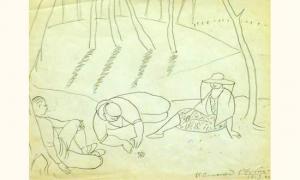
Winzer, the man who, before the War, had spent
the evenings in the Rotonde with Frederick Etchells
and myself, inventing silly poems. He was a great
friend of the Princesse Eugenie Murat's and I was introduced to her


to his lodgings in Victoria where I

the painter,
There was
I was accompanied
.
where



They were at the Coliseum. One evening I was


Valentine Prax. She was



Paul Poiret, the dressmaker, and made his beard







No comments:
Post a Comment